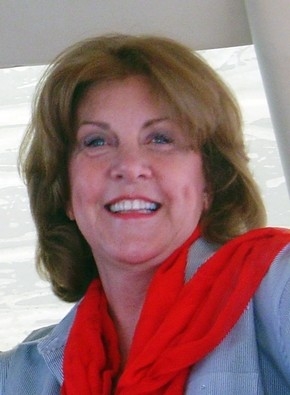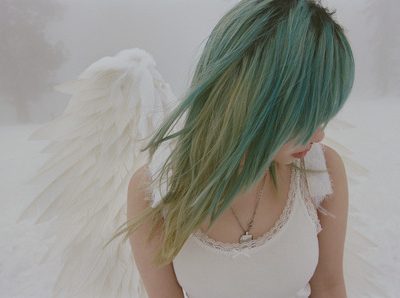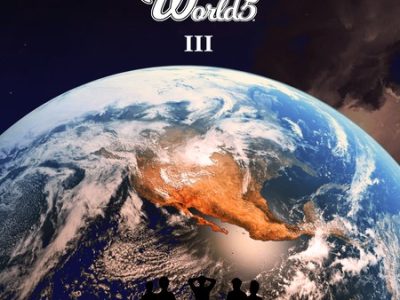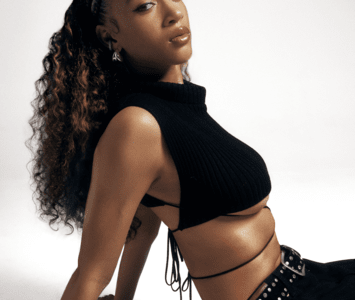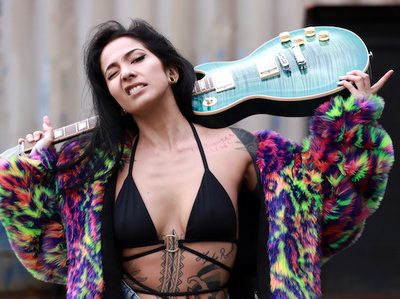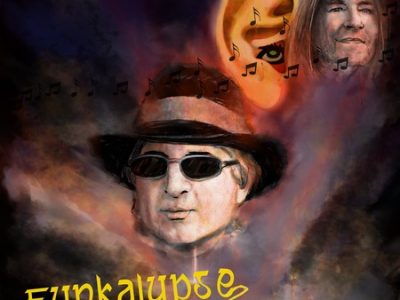Whether you know her as Bunty Bisharah, Sophie Boswell, Dierdre Boswell OR Bunty Boswell, one thing is for certain and that is that this Bunty is a woman of many faces. She states that “nothing in my life has been normal” and this definitely adds up to the fact that she has multiple identities. Like a chameleon in the thick grass, Bunty displays an array of big, bright colors. As a free-spirited, world-class traveler, Bisharah has a deep-rooted, spiritual connection to this world & beyond. Whether she’s playing the role of a singer/songwriter, painter, poet, inventor, sculptor, pianist, author, successful businesswoman OR trained nurse, there is certainly never a dull moment for Miss Bunty. Enjoy finding out about all of her exciting adventures past & present as Bunty gears up for a thrilling 2014! Get to know the one that calls herself the “ideas person”.
J Rae: Your name OR one of your names is Bunty Bisharah and I for one have never heard a name quite like that, so definitely caught my interest. May I ask if your name holds any literal meaning and also would you mind telling the Skope audience a little bit about your family roots?
Bunty Bisharah: About my name, I must agree that it makes people take a second look at me when first introduced.
Bunty was a nick name given to me as a toddler. Christened Deirdre, very few people used this name during my life other than bank managers and lawyers… As for Bisharah, this is an Arabic name that came to me when I married a beautiful man (a Bedouin Arab originally from Saudi Arabia).
Nothing in my life has been “normal”.
About my family roots, that’s all pretty traditional. My mother was born in Australia to ‘well-to-do’ parents with English heritage who belonged to the ‘landed gentry’ — wealthy landowners who bred cattle and sheep. Her father was an Army Major without a great sense of humor, so I was told. My mother was well-educated and especially good at English. She loved people, reading and had a good business sense.
My English-born father came from aristocratic roots, as did his mother, Kathleen Boswell, from Dublin. Her father and grandfather — both named James Boswell — were deputy Mayors of Dublin. Both families made their money from importing fine papers from Europe and manufacturing sterling silver. One of my English uncles played the organ well and my aunt was a very good portrait painter in oils. The Tudor mansion in Chester, complete with organ, still stands today.
Much was learned before I was born.
Despite this promising background, my father — the black sheep — opted out of the family business that had been running since 1640 and joined the Royal Irish Constabulary in Dublin in the early twenties. Like my mother’s father, the Major, he was a man of principles at a time when it was considered ‘the done thing’ to enlist for the sake of one’s country. After fighting in and surviving WW1, where he vividly remembered ‘the mud’ in Normandy, he somehow ended up on a camel alongside Lawrence of Arabia in Egypt, before setting off via the Suez Canal for that far-off land — Australia.
My father’s dream was to own and run a sheep station and live off the land. I’m not sure how he happened to be on a ship sailing for South America in 1928, where he met my mother, but there was a whirlwind romance and they were married in Fiji. There they lived on a copra plantation until the Great Depression hit and so set sail again for England where they virtually sat it out in style. Regular maintenance from the family estate made life relatively easy for them. And so, unlike my school friend’s families who were ‘down to earth’ Australians who’d never ‘been abroad’, my parents were worldly people.
My mother was forty and my father forty-seven when I was born in Toowoomba, a tiny country town in Queensland. When I was a child I thought that having older parents was a great disadvantage, but then through their extra years of living, they each passed on to me a multitude of things about life. “Never mind what the neighbors say Sophie — how would they know if they haven’t been anywhere?” Of course these remarks were to instill in my mind the idea of travelling; learning about life by living it rather than reading about it. Consequently, I first took off for Fiji and Tonga on a cruise ship when I’d just turned eighteen.
Regarding money and financial security, my father’s maintenance money ran out after the war, and, like most people in Australia, money, manufactured goods, books and some basic foods like milk and butter were in short supply. The reality of this combined with my parent’s pompous performance around the dining room table — damask linen napkins, sterling silver cutlery, butter knives, fine china and fresh flowers — caused some confusion in my mind. It was as if I lived in Good Olde England inside the house, then kicked my shoes off and ran outside to hare around in the dirt with my Aussie mates. I never had many toys and was bitterly disappointed that we couldn’t afford a piano, despite being able to play by ear and memory. Coming from Brisbane’s hot climate, all children considered “outside” to be their permanent playground.
J Rae: I see that you also go by Sophie Boswell as a pen name, so which do you prefer to be called?
Bunty Bishurah: Bunty Boswell
J Rae: How did the name Sophie Boswell come about in the first place?
Bunty Boswell: You know about Bunty (this was quite a common English nickname decades ago).
I like the name Bisharah and kept if after my husband died not so long ago. We had a spiritual connection — had been man and wife in another life time… Just FYI, four months after he died his voice came to me through a medium. He said he was on his “Star” and read out a love poem he’d written for me.
J Rae: I noticed that you just made a big move from Australia to the United States; Pennsylvania to be exact. What was the main reason behind moving to America and how has the US been treating you so far? And why Pennsylvania?
Bunty Boswell: First of all, America is treating me just fine; always did. I love America probably because I come more ‘alive’ here. This is where my energy is; positive energy. I like American’s outgoing, positive approach to life. In Australia we are psychologically still tied to England’s apron strings and tend to be more reserved. Mind you, this is changing at last, with the influx of Asian immigrants.
Perhaps my love affair with the USA had more to do with me not really liking Brisbane where I grew up. Before moving there when I was seven, I lived one sandy street away from the Pacific Ocean in Surfers Paradise. The wide beach that ran for sixteen miles to the south was my playground – the sky was my ceiling. Every afternoon after school, I swam in the ocean and observed nature. Brisbane then, by comparison, was a dusty dry place with brown grass, few trees, and houses built on stilts. I longed for my ocean.
My plan was to move to NYC after I finished my four year nursing training, but that fell through. Then I was engaged to an American engineer from San Antonio, and that fell through. I finally touched down on US soil when I was forty. I spent three weeks in Honolulu with my daughters and determined to live there one day. Eventually I bought a condo in Kauai having visited the Hawaiian Islands once a year for fifteen years when I ran a business in Sydney. The ten-hour flight was well worth it. Gradually I became acclimated to the American way of life and tired of living so far away from the rest of the world. Australia’s greatest problem, as I see it, is its isolation. People around me told me that I thought like an American.
Why Pennsylvania? Fate, I guess. Like much of the rest of my life…
After my husband died I ended up back in Australia where I wrote my first book “The Power of Feng Shui” and several songs. By this time I’d retired and, having been a free-spirited wanderer for five years, ending up in Dubai, I enjoyed living in rural Australia with the sheep, kangaroos, wombats and emus — creatures I saw each time I drove up the Alpine Way. Mind you, I didn’t enjoy the killer snakes and spiders but everything in life has its downside…
Coming back to your question about Philly, one daughter lived there and had a ‘Granny flat’ in Berwyn, a western suburb, and my youngest daughter lived in Washington DC. With NYC just up the mainline, it seemed a good spot. This was a relatively new part of America for me to explore. (I see my father’s wanderlust ways flowing through my veins here!) Considering I lived so far away from even the West coast of America, I was lucky to have seen a great deal and a great number of US States, even Alaska, when I popped up to Kotzebue in the Arctic Circle, as you do…
Basically, without a husband or time constraints, I enjoy settling into new places and learning about the ways of the people there. And when it comes to writing books, this gives me all the material I need. Just now I’m in Boston since my daughter in Philly moved to San Francisco. My time is now divided between Boston and Mill Valley in northern California.
“No moss grows on a rolling stone!”
J Rae: What are some of the major differences between life in the Land Down Under vs. the United States?
Bunty Boswell: Wi/FI…. Ha. Ha.
As beautiful as the countryside is, Australia is an island in the middle of nowhere and on the wrong side of the equator while America has Canada and Mexico for mates and is close to where the action is.
Trying to compare these two huge continents is like describing night and day. When asked about Australia here in the States, people are always amazed to hear that Australia’s population is around twenty-one million. America was settled one hundred and forty years before the English claimed the discovery of Australia, and then, being so far away, it took a long time to forge a settlement on Sydney’s harbor-side shores. Unlike being in Boston — a stone’s throw away from the UK — getting people and supplies from London to Sydney was a mammoth job. The very first settlement in 1877 was abandoned altogether due to extreme difficulties.
Another major difference is that the population in Australia is mainly white — White Anglo Saxon Protestants – and many of those came from the wrong side of the tracks way back when England decided to dump its unwanted riff-raff (convicts), in this inhospitable desert about which they knew very little. In fact, it wasn’t until the conservative Australian government relaxed their ‘Keep Australia White Policy’ some time after WW1, that Greeks and Italians were able to dribble through the customs counters to begin their new life offering wondrous things, according to the propaganda. The only black people, Australia’s indigenous people, were pushed as far ‘out west’ as the government could manage until there was finally a huge uproar in the 1990’s. These days Arabs, more Asians, and Africans are able to settle, but just like America, this process is painfully slow and difficult.
Some good things — policies — Australia has, are to do with the government being more humane, if you like, about what’s good for the people e.g.
Australians get four months annual leave with long breaks over Christmas and Easter.
Healthcare, including hospitalization, is free.
There is an age pension for all citizens.
The Australian economy is much healthier just now, than the US economy.
One bad and sad thing about Australia is the way men treat women in general. Chauvinism is strong and healthy. At parties or social gatherings the men gravitate to where the grog is while the women flock together and grumble about it. And this has been going on for decades as if it’s just the Australian way. In America things are very different. Respect, even admiration, comes into play. Another bad thing, but fact, is the way most Australian men treat women. Chauvinism runs riot through all social classes.
Compared to the US, there are very few homeless people and life is generally much easier due to a more habitable climate. Eighty percent of people live on the coastal strip that runs between the Pacific Ocean and The Great Diving Range.
Relaxation and holidays for most Australians means spending a day or a few weeks at the beach. I think this accounts for a more lackadaisical attitude for which Aussies are known. “She’ll be right mate” is a great way of putting things off.
When it comes to education, colleges and universities, Australia has a handful compared to US. (Boston alone has about ninety colleges and universities.) But some great things come from educated Australians; Penicillin and seatbelts, to name two. A new situation exists where opportunities for talented and educated Australians dry up and they are forced to seek work elsewhere. You might say that the cream of the country runs into a brick wall. Look at the entertainment industry — so many Australians end up in Los Angeles and rarely return.
While many Australian friends tell me they love it there because they’re away from the violence, racism and the rat-race, I see this isolation stifling; and you need to have a lot of money to travel abroad regularly. But then again, where you dwell is all about your energy matching your surroundings.
J Rae: I couldn’t help but notice that you are a trained nurse, successful businesswoman, inventor, landscape artist, world-traveler, sculptor, painter, pianist, poet and writer. You are definitely one busy bee and so I have to ask how do you find the time for all of this?
Bunty Boswell: This makes me chuckle. It’s only recently that I discovered that most people excel at one thing. I had always thought that everyone could do multiple things if they put their mind to it. In hindsight I think I should have been a scientist who liked painting on weekends. Even as a little girl at age ten my entrepreneurial flair surfaced when I knitted babies booties and sold them to the local haberdashery shop. I came away with a firm order; put some of my earnings into a savings bank account; bought some more wool, and went into business. I also grew vegetables and sold them to the neighbors.
I’m an ideas person.
Nursing was something I always wanted to do. I think this ‘calling’ came when I was four years old, during the war, and saw nurses taking their patients for strolls past my house while I played in the garden looking for fairies in the poppies. But really, I was born to be an artist — a musician and a painter – but I was pointed in another direction by my mother who didn’t want me to turn out like my father. And guess what?
I believe that genes play an enormous role in the way a child develops. Persistence and determination were my greatest strengths. Even when things were tough, immediately after the war, I always managed to find a way to do what I wanted. At an early age I realized that to become independent I would need money and since none came my way, I continually thought up ways to earn some. I’d cultivate cacti, hand paint ceramic pots, make little houses from spent matches and Tarzan’s Grip, and turn out a nicely presented gift. The list went on and on. Eventually I had enough money to lend my brother money to buy his first Grundig turntable, amplifier and speakers. I charged him 10% interest because that was easy for me to calculate.
Needless to say, I left home the day I turned seventeen to begin nursing and never asked my parents for money again.
J Rae: As a person who has seen the world, the Skope Universe would love to hear about some of your most exciting destinations!
Bunty Boswell: As I mentioned, I sailed off to Fiji with a girlfriend at an early age. With my parents being married there I had some knowledge about the island and the natives, but to see people living in grass huts and scaling coconut trees to get their milk, was a revelation. Then, of course, ship life introduced me to a world of people, all older, thrown together to have fun. Every day and night was exciting — I never wanted it to end.
The next bit of excitement came when a Qantas plane came into land in Hong Kong — a notoriously dangerous approach — and to step out into the Orient with its dazzling neon signs and hundreds of people everywhere. That was 1970. A day or two later a not so exciting thing happened at the Athens Airport — a crash landing. No one was hurt but I hadn’t experienced fear like this before. Travelling by bus through Greece’s stony hillside to Delphi was a special day. Sipping chilled white wine on a wharf at Piraeus still lingers in my mind.
I lived in London for a year where going to college balls at Oxford, seeing art galleries, operas at Covent Garden, and touring all over the place by car on weekends provided never-ending excitement — the discovery of something new. Then came a tour, by caravan, of France, Spain, Italy, Switzerland, Germany and Belgium.
Next on the agenda was to spend a year in Hamilton, Ontario, where my husband worked at St. Joseph’s Hospital as a registrar while I looked after our daughter. While this wasn’t the most exciting city in the world, we made wonderful friends who originally came from Germany, had five children, loved Beethoven and delighted in showing us a grand time, Vermont included. I never wanted to return to Brisbane after this extravaganza.
Time stood still for a while before I began to take off for Hawaii regularly. I took my daughters on cruises to the Caribbean and the Mediterranean and later spent two weeks in Cancun, Mexico where I attended one of Tony Robbins’ seminars. People are motivated by PAIN or PLEASURE…. And FEAR was something to put behind you. To do this, nine hundred people lined up to walk on burning hot coals, which I did, and then the following day lined up again to jump from the top of a fifty foot pole. Of the two, jumping off the pole, for me, was far more frightening. Of course there was extensive mental training for these ‘activities’, beforehand. But you couldn’t call it boring…
Of all my travels to fun places, my visit to the U.A.E. — exotic Arabia — was the most exciting. I was fifty-nine when I first saw Dubai. This was before September 11, and before many westerners had visited this part of the world, so it was both exciting and a bit scary knowing how hands were chopped off every Saturday morning in the marketplace in Saudi Arabia. Still, Dubai at that time was voted the safest nation in the world by NATO.
You can’t travel and grow by holing up in your six star hotels and waiting around aqua pools for a suave waiter to bring you a cocktail! Going on a Safari in a 4WD — sand-skiing down two-hundred foot high orange dunes, has to be up there with the most thrilling adventures. Smoking flower-flavored sisha out in the dunes at midnight and beneath a star-studded sky was mindboggling.
One of the great days in my life was to meet a Bedouin family who’d never spoken to a Western woman before, and to go on a picnic with them; a picnic on stony ground beside the Arabian Sea with the mighty Hajar Mountains reaching for the rainless sky. They bestowed lovely gifts, scarves and a gold bracelet, and took me for a paddle in the turquoise water.
Time stood still that day.
J Rae: We’re all dying to know what you have invented thus far and any new ideas in the works?
Bunty Boswell: My US patent is for a ready-made compression glove with a sizing chart. This came from knowledge that built up over twenty years when I ran a company that supplied hospitals with custom-made garments for badly burned people and various vascular disorders. Having designed the glove, label, swing tag and packaging, I flew to Hong Kong to search out a manufacturer. Speaking my best Hong Kong English, I returned with everything I needed and went ahead with the manufacturing.
When every hospital in Australia ordered them regularly I felt thrilled to have come up with something that would help people heal — something useful and inexpensive.
J Rae: As Sophie Boswell you have written three books and I’m curious as to what these titles are about? Why did you decide to write these three books?
Sophie Boswell: If you go to http://www.authorsophieboswell.com my three books come up.
“The Power of Feng Shui” is the first. This story is about the POWER of feng shui — what happened after I applied the principals to my home in Sydney. It’s also a love story.
“Journey of the Mind Poems & Lyrics”
This is a collection of my poetry and lyrics. Many poems are about or to do with the Snowy Mountains of Australia. Since publication, several lyrics have been set to music.
“Breaking Loose: an Australian Story”
This story is about growing up in Brisbane, Queensland, during the 40’s and 50’s; the struggle with my brother, and an account of post-war life in Australia.
J Rae: You’re an accomplished poet and so I have to ask where does your deepest inspiration come from when writing poetic verses?
Sophie Boswell: Different things inspire me to pick up a pencil and pad and begin jotting down thoughts. This isn’t something I can will. Usually at unexpected times a simple thought will gather momentum like water dripping on a stone to become a babbling brook.
I believe that the Spirit world plays a hand in my songwriting since I can get lost in thought; time and space — go into a mode of some sort. Sometimes at night when I’m trying to get to sleep a melody will float around the grey matter. It keeps coming in waves and I’ve been known to get up and go to the piano at all hours because, if I don’t, by the next morning nothing will bring this song back. Weird!
I’m not one of those songwriters who can come up with a song because someone wants it about something specific.
J Rae: In your role as a songwriter you have won several awards and so what inspires you here to come up with lyrics?
Bunty Bisharah: Anything can inspire a song; people, places, thoughts, a sound, rhythm and wind, to name a few. Being able to communicate with the way you’re feeling through words and melody, is a truly great art. One that cannot be taught, I believe. It’s like you can sing in tune or your cant.
Solitude plays a vital role, for me. I can be distracted when painting landscape but I can’t be distracted while working on a song. I really need to carry a tape recorder around with me as fleeting thoughts come and go quickly. It takes me a long time to compose a song and even longer to put it into a manuscript since I can’t read music well. I do know chords by heart, which helps.
One of my first lyrics, “The Resting Place”, came to me several weeks after I’d spent an afternoon in a graveyard that overlooked a magnificent lake. It was on a steep slope. I thought about life and death and how many religions believe in heaven and hell like black and white. Then a thought came to mind; what if you’d done your best? This thought became the chorus for this song.
I sent it off to the Song of the Year people in Houston and was astounded when I saw it was a finalist out of the thousands of entries they get. I was even more astounded when I saw that Norah Jones was the judge. (This was for the lyrics).
Two years later, when I wrote the music, this song was again a finalist. I believe that the lyrics and the music go together perfectly. It can be heard on iTunes and bought from http://www.hilltoprecords.com/songwriters/buntybisharah
J Rae: You mentioned that your favorite singer is Norah Jones and I’d like to know why you chose her over the millions of other singers out there?
Bunty Bisharah: I like Norah’s voice, her clear enunciation of words, and her timing. And I love her piano playing and the backing. There’s just something about New Orleans musicians — a soul thing.
J Rae: I see that you have a soft spot for Classical & Jazz and I was hoping you could tell us what attracted you to these styles in particular?
Bunty Bisharah: I was a young teenager when jazz came to me via the Boston Pops on Saturday mornings. Also, my brother by this time was collecting the 78 rpm records of his favorite jazz musicians.
The radio was always on in our household. My mother loved the music of the day, all the Broadway show music, Swan Lake and The Nutcracker Suite, The Ink Spots and Old Man River, and light classical music. Jazz and opera were not on her agenda but the next door neighbor, one with a piano, taught me little pieces by Chopin, Schubert, Beethoven, Schumann and Strauss. Later I progressed to Sibelius. But jazz, a new thing in Brisbane, was fun. I loved the chords, the clarinet, trumpet and drums played by Eddy Kruger.
Putting this all together, my out-of-school hours were filled with music of one sort or another. Sadly, my Grammar School didn’t teach me anything because I hadn’t learned ‘properly’, beginning at Grade 1. I hated my school for this reason and left the moment I could. I found a job, by chance, age fifteen, in a small firm that sold Piper Aircraft, Grundig electronic gear, and taught jazz music — The Shefte College of Music. Poppy Douglas was my teacher and this was one of the happiest years of my life.
J Rae: Who are some of your favorite Jazz & Classical composers?
Bunty Bisharah: Oscar Peterson is my favorite jazz composer. Some types of jazz don’t appeal to me at all. Guess I enjoy the traditional New Orleans jazz the best. I make no distinction between Jazz and classical music. It’s all music.
Johan Sebastian Bach’s music takes me to a place of deep contentment. I play his music when I paint and go into a ‘mode’ of blissful concentration where I’m not conscious of hearing the music at all. It’s only when the music is turned off that I become aware that it was on, if that makes any sense.
I also love Beethoven’s sonatas and symphonies. Mozart’s (“Old Mo” my father used to call him), symphonies carry me away with them. Rachmaninoff’s romantic concertos serenade me. Carmen is my favorite opera. Sibelius and Wagner appeal to me when I’m in that mood. One of the few classical composers I dislike is Shostakovich. His music gets on my nerves, rather like the bagpipes…
Birdsong, waterfalls, the wind in the willows, ocean waves rolling in, the rhythm of locomotors, Indian drums and wolves howling are all music to my ears.
EPK: http://www.sonicbids.com/band/buntybisharah2/
J Rae: You have recorded some songs with HillTop Records out of Hollywood and so what’s it been like working with them? Actually, your song “The Resting Place” was recorded by HillTop and it was up for Song of the Year in Houston! That had to be a pretty exciting feeling for you?
Bunty Bisharah: Working with Tom Hartman from Hilltop Records, via mail, has been very rewarding — a relationship built on respect and trust. This recording company came to me via the copyright office in Washington DC, at a time when I had no idea what to do with my songs or where to begin. Since I’m not a singer and was out of contact with people in the music industry due to living in the wilderness for several years, having someone in America willing to arrange and record my music was like a dream come true.
And thank God for the Internet. I began sending my songs and lyrics to the Song of the Year competition. Also a Polish group who had their Festival in the Snowy Mountains, took to my lyrics and music and I won awards there as well.
This WAS exciting. At last, someone believed in me.
My only frustration here had to do with the local radio station in Jindabyne refusing to ‘air’ my songs. (This comes back to what’s the difference between Australia and America.) From that time on I concentrated on my songwriting career in America.
J Rae: With everything you have you going on, what are your main goals for 2014?
Bunty Bisharah: My goal for 2014 is to keep on doing what I’ve been doing for the past few years — to paint and have an exhibition, to write more songs and have them recorded, and to begin writing another book. There’s an art gallery in Mill Valley willing to hang my Hawaiian paintings and the Cambridge Art Association, here in Cambridge/Medford, will jury my recent works. I also plan to create 3D paintings based on a series of these I did thirty years ago. These are large sculptural works made from stretched canvas, all white, but have color applied via miniature lights. I had a one person exhibition with these in 1981.
A Nashville business has recently asked for my songs and has recorded my latest song “Yes We Can” and they have done a beautiful job. I’ll be sending them more work. I’ll be getting a CD together soon. Many radio stations are waiting for this which is exciting.
People-watching is not so much a goal but an occupation I took up when I was ten years old. I love getting to know new people and some of these find their way into my books. My next book will be about the spirit world and afterlife. So, yes, there’s a lot to do. I feel fortunate to be able to swap my various talents around — too much of anything gets tiring. But music is my God. I play the piano for pleasure — like a cat licking itself — every day.
www.hilltoprecords.com/songwriters/buntybisharah
By Jimmy Rae (jrae2@att.net)
